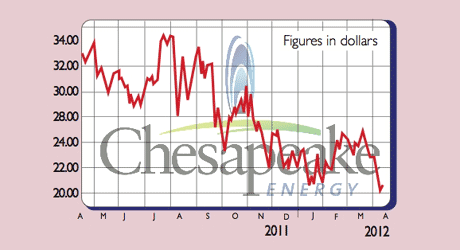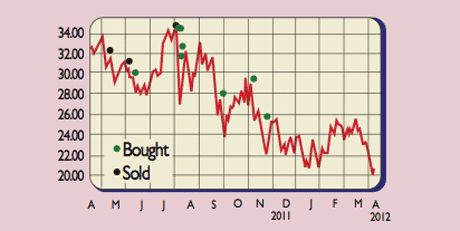Shares in focus: America’s number two gas giant
Natural gas producer Chesapeake has suffered from the low price of gas in recent years. But prices can't stay low forever - so is now the time to buy in? Phil Oakley investigates.
Get the latest financial news, insights and expert analysis from our award-winning MoneyWeek team, to help you understand what really matters when it comes to your finances.
You are now subscribed
Your newsletter sign-up was successful
Want to add more newsletters?

Twice daily
MoneyWeek
Get the latest financial news, insights and expert analysis from our award-winning MoneyWeek team, to help you understand what really matters when it comes to your finances.

Four times a week
Look After My Bills
Sign up to our free money-saving newsletter, filled with the latest news and expert advice to help you find the best tips and deals for managing your bills. Start saving today!
Chesapeake is cheap for a reason, but the shares remain a buy for the brave, says Phil Oakley.
The business
Chesapeake Energy is the second-largest producer of natural gas in America. It also produces oil and natural gas liquids such as propane and butane. It has proven equivalent gas reserves of 18.8 trillion cubic feet (tcfe). The firm also has large amounts of undeveloped land that may help it to grow its reserves in the future.
Chesapeake's strategy is based on discovering and developing unconventional sources of gas and oil in onshore locations. It has a leading position in the US shale gas industry. It also owns oil field services businesses, making it a vertically-integrated' energy company.
MoneyWeek
Subscribe to MoneyWeek today and get your first six magazine issues absolutely FREE

Sign up to Money Morning
Don't miss the latest investment and personal finances news, market analysis, plus money-saving tips with our free twice-daily newsletter
Don't miss the latest investment and personal finances news, market analysis, plus money-saving tips with our free twice-daily newsletter
The history
Starting out with $50,000 of capital, Aubrey McClendon and Tom Ward formed the firm in 1989. They wanted to search for gas in unconventional areas and use new horizontal drilling techniques. These techniques promised big improvements in the productivity of gas and oil reservoirs.
The first few years were very successful as Chesapeake built up reserves and production in Oklahoma and Texas. Rapid growth led to a stockmarket flotation in 1993. Further success followed in 1994 with a large gas discovery in Texas.
The company faced tougher times during the late 1990s. High drilling costs and low gas prices put pressure on Chesapeake's profits and finances. So the 2000s saw a change in strategy. Chesapeake aggressively bought land to develop shale gas reserves. This coincided with a rising price of US natural gas and profits soared.
However, the American shale gas boom during the last decade has led to a glut of natural gas supplies and prices have since collapsed. So Chesapeake has looked to develop natural gas liquids (NGLs), for which prices are higher.
But its expansion has come at a cost. High levels of debt and lower profits have placed a great strain on the company's finances. Chesapeake is now having to sell off more assets to fund its investment programme.
The chief executive
Aubrey McClendon has been chief executive since the company was formed in 1989. But he started his first oil and gas company Chesapeake Investments in 1982, aged 23. McClendon is no stranger to controversy. The latest issue, which erupted this week, concerns him borrowing $1.1bn against his stake in thousands of Chesapeake's wells.
Meanwhile, in 2008, he faced a shareholder revolt after receiving a $75m bonus. That same year, after borrowing money to buy Chesapeake shares, he was forced to sell 90% of his holdings after his loan was called in. He is also known for buying art for the company headquarters and amassing a wine portfolio consisting of 100,000 bottles. His basic salary is $975,000, frozen until 2013.
Should you buy the shares?
Putting McClendon aside for the moment, the stockmarket is worried about the combination of low gas prices and Chesapeake's debts. The company's plans to develop more-profitable gas liquids mean it is spending a lot more cash than it takes in. It does not expect to balance its cash flows until at least 2014. Meanwhile, it is selling land and future gas production in advance to balance the books.
But gas prices surely won't stay depressed forever, amid rising demand for use in transport and electricity generation. Some analysts even talk of the US becoming a net gas exporter. If so, then Chesapeake could be a very geared play on this scenario.
The shares look cheap with a 2012 forecast book value of $23.80 per share well below the current price. A return to long-term average gas prices currently around 90% below peak levels could see substantial upside. On the other hand, the CEO's recent actions are concerning, and raise questions over how the company is run. It's a case of buyer beware' with Chesapeake, but given time, it could pay out in style if gas prices rally.
The numbers

Stockmarket code: CHK
Share price: $19.92
Market cap: $13.2bn
Net assets (Dec 2011): $16.6bn
Net debt (Dec 2011): $10.7bn
P/e (current year estimate): 11.6 times
Yield (prospective): 1.2%
What the analysts say
Hold: 14
Sell: 4
Average price target: $28.86
Director shareholdings

A McClendon: 3,272,379
S Dixon: 1,145,643
D Dell'Osso: 355,471
Get the latest financial news, insights and expert analysis from our award-winning MoneyWeek team, to help you understand what really matters when it comes to your finances.
Phil spent 13 years as an investment analyst for both stockbroking and fund management companies.
-
 How a ‘great view’ from your home can boost its value by 35%
How a ‘great view’ from your home can boost its value by 35%A house that comes with a picturesque backdrop could add tens of thousands of pounds to its asking price – but how does each region compare?
-
 What is a care fees annuity and how much does it cost?
What is a care fees annuity and how much does it cost?How we will be cared for in our later years – and how much we are willing to pay for it – are conversations best had as early as possible. One option to cover the cost is a care fees annuity. We look at the pros and cons.